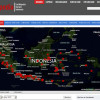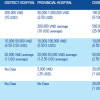Eduardo Bohorquez and Deniz Devrim of Transparencia Mexicana, our national chapter in Mexico, recently published an article arguing for the abolishment of the word “petty” in the term “petty bribery”. They point out that petty bribery in fact generates substantial costs to society, both monetary and non-monetary. For example, surveys find that in Mexico households […]

Fail Again. Fail Better: Reform of the EU Banking Sector.
Samuel Beckett’s exhortation to “fail better” could also be applied to the EU banking sector. Time and time again, troubled financial institutions have been bailed out by the taxpayer because they have been perceived as “too important to fail”. The ability of a large number of banks to benefit from excessive risk-taking without fully absorbing […]

EURO 2012 and match-fixing: An interview with Simon Kuper
Every four years all eyes in Europe are on one big event – the European Football Championships. Over the past weeks everyone in Europe seemed to talk about the matches, its players, but also about what it means for the two host countries, Poland and Ukraine, to host such a majour event. One big question […]

Courtroom Drama in The Philippines: Impeachment Trial finds Chief Justice guilty
May 29, 2012. The whole nation is watching the 2nd impeachment trial in Philippine history. The usually busy streets of Manila are on standstill. Even taxi and jeepney drivers stop to personally witness the verdict. All television and radio shows feature one event: the final judgment on the impeachment trial of Renato C. Corona, the […]

Hamburg’s Transparency Law to open government more than ever
The Beatles played their first concert in Hamburg. Hamburg’s harbour is one of Europe’s largest. Now Hamburg, one of Germany’s 16 federal states, also has one of the world’s best transparency laws. Passed in mid-June, the new law sets a precedent that might resonate in the worldwide open government community. The new 10-page Hamburg Transparency […]

Korupedia.org: New sanctions for corruptors
No one disagrees with the importance of law enforcement to diminish corrupt practices. Yet, sometimes social sanctions are much more effective. This is the idea behind www.korupedia.org, the first online list of corruptors in Indonesia. Initiated by anti-corruption figures and prominent journalists, the site was launched in Warung Daun Kafe, Jakarta on June 12. Korupedia […]
Rio +20: The future we want is corruption-free
Corruption has finally made it onto the Rio+20 agenda. Released over the weekend, the latest draft of the “Future we Want” outcome document recognizes for the first time that “corruption diverts resources away from activities that are vital for poverty eradication, the fight against hunger and sustainable development” – the goals of the summit. As […]

Vietnam: Who pays the doctor?
Transparency International’s National Contact in Vietnam, Towards Transparency, has just published a report on health. Our colleagues Stephanie Chow and Conrad Zellmann report.” “Years ago, my 2-year-old son required surgery. I had a pre-existing relationship with a doctor at that hospital. But I was worried before the surgery when I had not given money to […]

EU agencies face long summer cooling off
You have never heard of them, but they assess the safety of the food you eat, the water you bathe in and the drugs your doctor prescribes. Welcome to the world of European Union agencies – independent, arms-length bodies established by the EU to provide specialist advice and expertise to policy makers on a wide […]

Keeping elections clean: TI-Malaysia launches Election Integrity Pledge
Uncontrolled and unchecked spending and a culture of money politics can disrupt the proper functioning of Malaysia’s political system. For example, Transparency International Malaysia’s research on political financing shows that the party leading the ruling coalition held assets of more than EUR 350 million in 2004. The EUR 50,000 limit on campaign spending is rarely […]
- State Capture in South Africa 14 February 2017
-
 What’s next for Ukraine?
16 December 2016
What’s next for Ukraine?
16 December 2016
-
 Cleaning up sport: conflicts of interest at the top
9 December 2016
Cleaning up sport: conflicts of interest at the top
9 December 2016
-
 OGP: France must do more to tackle corruption
9 December 2016
OGP: France must do more to tackle corruption
9 December 2016
-
 Pharma companies in Slovakia: Uncovering conflicts of interest
9 December 2016
Pharma companies in Slovakia: Uncovering conflicts of interest
9 December 2016
-
Nokubonga Ndima: Young people can make a change for a better future...
-
Benjamin M: Very good article! Congrats!...
-
arun kottur: In India sports minister was involved decades are ...
-
Ekonomi: Very beneficial article. Thank you very much. htt...
-
ksweeney1: I do not agree that https://apex.aero/2016/09/22/g...
Search
Categories
Latest news from Transparency International
No items, feed is empty.


 Connect with us on Facebook
Connect with us on Facebook Follow us on Twitter
Follow us on Twitter